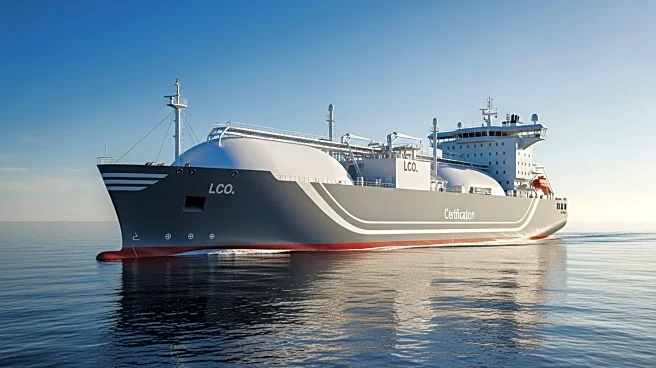What's Happening?
ClassNK has granted an Approval in Principle (AiP) for a new large liquefied CO2 (LCO2) carrier developed by Dalian Shipbuilding Offshore and Nantong Offshore Design & Research Institute. This certification confirms the vessel's compliance with regulatory and safety standards, as outlined in ClassNK's 'Rules and Guidance for the Survey and Construction of Steel Ships'. The vessel's design adheres to the International Gas Carrier (IGC) Code, which governs the construction and equipment of ships carrying liquefied gases like LCO2 and LNG in bulk.
Why It's Important?
The certification of this LCO2 carrier is a significant milestone in the maritime industry, particularly in the context of global efforts to reduce carbon emissions. As industries seek sustainable solutions for carbon capture and storage, the development of LCO2 carriers is crucial for transporting captured CO2 to storage sites. This advancement supports the maritime sector's transition towards greener technologies and aligns with international environmental goals. The successful certification by ClassNK enhances the credibility and marketability of the vessel, potentially leading to increased demand and further innovation in this field.
What's Next?
Following the certification, the next steps involve the construction and deployment of the LCO2 carrier. The shipbuilders may seek additional partnerships and contracts to expand their market presence. Regulatory bodies and environmental organizations will likely monitor the vessel's performance and impact on carbon reduction efforts. The success of this project could influence future regulations and standards for LCO2 transportation, encouraging more shipbuilders to invest in similar technologies.
Beyond the Headlines
The development of LCO2 carriers represents a broader shift towards integrating environmental considerations into maritime engineering. This trend highlights the growing importance of sustainable practices in traditionally carbon-intensive industries. As the maritime sector evolves, stakeholders must navigate complex challenges related to technology adoption, regulatory compliance, and environmental impact, necessitating collaboration across industries and governments.









